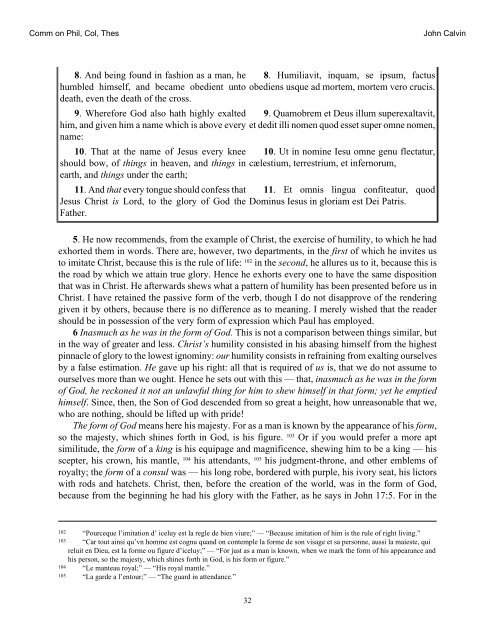Commentary on Philippians, Colossians, and Thessalonians
Commentary on Philippians, Colossians, and Thessalonians
Commentary on Philippians, Colossians, and Thessalonians
Create successful ePaper yourself
Turn your PDF publications into a flip-book with our unique Google optimized e-Paper software.
Comm <strong>on</strong> Phil, Col, Thes<br />
8. And being found in fashi<strong>on</strong> as a man, he 8. Humiliavit, inquam, se ipsum, factus<br />
humbled himself, <strong>and</strong> became obedient unto obediens usque ad mortem, mortem vero crucis.<br />
death, even the death of the cross.<br />
9. Wherefore God also hath highly exalted 9. Quamobrem et Deus illum superexaltavit,<br />
him, <strong>and</strong> given him a name which is above every et dedit illi nomen quod esset super omne nomen,<br />
name:<br />
10. That at the name of Jesus every knee 10. Ut in nomine Iesu omne genu flectatur,<br />
should bow, of things in heaven, <strong>and</strong> things in cælestium, terrestrium, et infernorum,<br />
earth, <strong>and</strong> things under the earth;<br />
11. And that every t<strong>on</strong>gue should c<strong>on</strong>fess that 11. Et omnis lingua c<strong>on</strong>fiteatur, quod<br />
Jesus Christ is Lord, to the glory of God the Dominus Iesus in gloriam est Dei Patris.<br />
Father.<br />
5. He now recommends, from the example of Christ, the exercise of humility, to which he had<br />
exhorted them in words. There are, however, two departments, in the first of which he invites us<br />
to imitate Christ, because this is the rule of life: 102 in the sec<strong>on</strong>d, he allures us to it, because this is<br />
the road by which we attain true glory. Hence he exhorts every <strong>on</strong>e to have the same dispositi<strong>on</strong><br />
that was in Christ. He afterwards shews what a pattern of humility has been presented before us in<br />
Christ. I have retained the passive form of the verb, though I do not disapprove of the rendering<br />
given it by others, because there is no difference as to meaning. I merely wished that the reader<br />
should be in possessi<strong>on</strong> of the very form of expressi<strong>on</strong> which Paul has employed.<br />
6 Inasmuch as he was in the form of God. This is not a comparis<strong>on</strong> between things similar, but<br />
in the way of greater <strong>and</strong> less. Christ’s humility c<strong>on</strong>sisted in his abasing himself from the highest<br />
pinnacle of glory to the lowest ignominy: our humility c<strong>on</strong>sists in refraining from exalting ourselves<br />
by a false estimati<strong>on</strong>. He gave up his right: all that is required of us is, that we do not assume to<br />
ourselves more than we ought. Hence he sets out with this — that, inasmuch as he was in the form<br />
of God, he reck<strong>on</strong>ed it not an unlawful thing for him to shew himself in that form; yet he emptied<br />
himself. Since, then, the S<strong>on</strong> of God descended from so great a height, how unreas<strong>on</strong>able that we,<br />
who are nothing, should be lifted up with pride!<br />
The form of God means here his majesty. For as a man is known by the appearance of his form,<br />
so the majesty, which shines forth in God, is his figure. 103 Or if you would prefer a more apt<br />
similitude, the form of a king is his equipage <strong>and</strong> magnificence, shewing him to be a king — his<br />
scepter, his crown, his mantle, 104 his attendants, 105 his judgment-thr<strong>on</strong>e, <strong>and</strong> other emblems of<br />
royalty; the form of a c<strong>on</strong>sul was — his l<strong>on</strong>g robe, bordered with purple, his ivory seat, his lictors<br />
with rods <strong>and</strong> hatchets. Christ, then, before the creati<strong>on</strong> of the world, was in the form of God,<br />
because from the beginning he had his glory with the Father, as he says in John 17:5. For in the<br />
102 “Pourceque l’imitati<strong>on</strong> d’ iceluy est la regle de bien viure;” — “Because imitati<strong>on</strong> of him is the rule of right living.”<br />
103 “Car tout ainsi qu’vn homme est cognu qu<strong>and</strong> <strong>on</strong> c<strong>on</strong>temple la forme de s<strong>on</strong> visage et sa pers<strong>on</strong>ne, aussi la maieste, qui<br />
reluit en Dieu, est la forme ou figure d’iceluy;” — “For just as a man is known, when we mark the form of his appearance <strong>and</strong><br />
his pers<strong>on</strong>, so the majesty, which shines forth in God, is his form or figure.”<br />
104 “Le manteau royal;” — “His royal mantle.”<br />
105 “La garde a l’entour;” — “The guard in attendance.”<br />
32<br />
John Calvin















